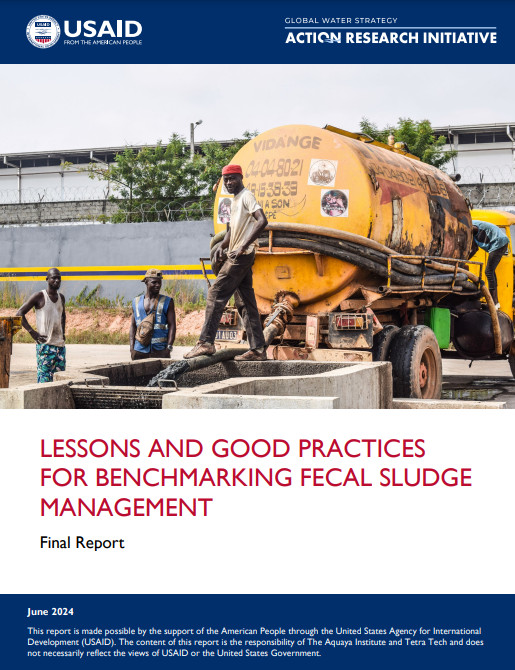Lessons and Good Practices for Benchmarking Fecal Sludge Management
 |
Leçons et bonnes pratiques pour l’analyse comparative de la gestion des boues de vidange
rapport May 2024 ; 86 pages
Ed. USAID - Washington
Téléchargeable sous format: PdF
Téléchargeable chez l'éditeur
Page de présentation d'un éditeur
Résumé:
L’analyse comparative – évaluant les indicateurs de performance pouvant être comparés aux objectifs, aux valeurs historiques et à d’autres entités – a été largement adoptée par les grands services publics de l’eau et des eaux usées comme approche visant à favoriser l’amélioration des performances. Ces dernières années, les villes, les régulateurs et autres ont commencé à adopter des analyses comparatives pour la gestion des boues fécales (FSM). Cette étude, entreprise par USAID/URBAN WASH , synthétise la littérature et les études de cas pour répondre à la question : quelles sont les bonnes pratiques pour les systèmes d'analyse comparative des FSM, et comment celles-ci devraient-elles être mises en œuvre dans différents contextes institutionnels ou de gouvernance ? Abstract:
Benchmarking–assessing performance indicators that can be compared to targets, historical values, and other entities–has been widely adopted by large water and wastewater utilities as an approach to fostering performance improvements. In recent years, cities, regulators and others have begun adopting benchmarking for fecal sludge management (FSM). This study, undertaken by USAID/URBAN WASH, synthesizes literature and case studies to address the question: What are good practices for FSM benchmarking systems, and how should these be implemented in different institutional or governance contexts?
Multiple scales and types of benchmarking exist for water and sanitation providers, including organizational, citywide, national, regional, and international initiatives. The diversity of actors involved in carrying out on-site sanitation services often leads to a multiplicity of key performance indicators, which makes data collection resource-intensive and interpretation by local officials difficult. Based on an assessment of 98 indicators that have been used across the case studies or in national or regional benchmarking initiatives, this study recommends a short list of high-priority indicators for city-level FSM benchmarking.
The research finds that FSM benchmarking is a versatile tool that can improve transparency, foster competition, strengthen advocacy, and inform financial and management decisions. However, a functioning FSM system must underpin the use of benchmarking to drive performance improvement, requiring attention to infrastructure, regulatory standards, tariffs, organizational readiness, and communication among participating actors. Good practices expected to reinforce sustained effectiveness of benchmarking programs revolve around selecting a limited number of consistent indicators, adequate data management systems, incentives, and public information sharing.
Mot clef: |
Editeur/Diffuseur: |
|
USAID
-
US Agency for International Development - Washington - Etats Unis |
En cas de lien brisé, nous le mentionner à communication@pseau.org